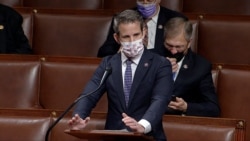State and local Republican groups in the United States are rebuking national lawmakers from their own party who voted to impeach or convict former President Donald Trump of inciting an insurrection at the U.S. Capitol last month.
The Senate acquitted Trump on Saturday of a single charge of having incited the deadly January 6 attack on the seat of the U.S. Congress as that body was meeting to certify that Democrat Joe Biden had defeated Trump in the November presidential election.
However, seven Senate Republicans joined all 50 Democrats in voting in favor of conviction, providing a 57-43 margin that was 10 votes short of the required two-thirds majority needed for a conviction.
Since the acquittal, state Republican committees in North Carolina and Louisiana censured two of their respective Republican senators, Richard Burr and Bill Cassidy, for voting to convict Trump — a fellow Republican whose only term in office ended with Biden’s inauguration January 20.
“The Republicans across North Carolina, the party leaders that I talked to, were shocked and disappointed with Senator Burr’s vote and wanted to put out a statement saying that we disagreed with him,” state Republican chairman Michael Whatley told CNN on Tuesday.
Burr, who is not running for reelection next year after three six-year terms in the Senate, said in response, “It is truly a sad day for North Carolina Republicans. My party’s leadership has chosen loyalty to one man (Trump) over the core principles of the Republican Party and the founders of our great nation.”
Whatley said he did not think Trump, who urged hundreds of his supporters to confront lawmakers as they certified Biden’s election victory, was to blame for the January 6 riot at the Capitol that left five people dead, including a Capitol Police officer whose death is being investigated as a homicide.
“I think the fault lies with the people who attacked the Capitol,” Whatley said.
In Louisiana, the state Republican Party’s executive committee unanimously censured Cassidy after he joined the six other Republicans in voting against Trump.
“We condemn, in the strongest possible terms, the vote … by Sen. Cassidy to convict former President Trump,” the group said in a tweet Saturday. “Fortunately, clearer heads prevailed, and President Trump has been acquitted of the impeachment charge filed against him.”
Cassidy said, "Our Constitution and our country is more important than any one person. I voted to convict President Trump because he is guilty."
Other state Republican organizations are attacking or considering rebukes of the other five Republican senators who voted against Trump: Pat Toomey of Pennsylvania, Mitt Romney of Utah, Susan Collins of Maine, Lisa Murkowski of Alaska and Ben Sasse of Nebraska.
Dave Ball, a county Republican official in Pennsylvania, rebuked Toomey for his vote, saying, “We did not send him there to vote his conscience. We did not send him there to do the right thing or whatever he said he was doing. We sent him there to represent us.”
Toomey, who is retiring after two terms in the Senate, said, “I did what I thought was right, and I would certainly like to think that regardless of my political circumstances or whether I was running for office again or not, I would do the same thing.”
Ten Republicans in the House of Representatives who joined all 222 Democrats in the chamber to impeach Trump a week after the mayhem at the Capitol and a week before he left office have also faced censures and rebukes from party officials.
A group of conservative House Republicans who opposed Trump’s impeachment tried to remove Congresswoman Liz Cheney of Wyoming from her No. 3 leadership position in the party caucus, but she easily survived a vote of confidence.
Congressman Adam Kinzinger of Illinois, an outspoken Trump critic, has been disowned by his own family for his vote to impeach Trump.
Kinzinger said 11 family members sent him a handwritten two-page note that started, “Oh my, what a disappointment you are to us and to God!”
The letter accused him of working with “the devil’s army,” which it said included Democrats and the “fake news media.”
“We thought you were ‘smart’ enough to see how the left is brainwashing many ‘so called good people’ including yourself” and other Republicans. “You have even fallen for their socialism ideals! So, so sad!”
“It is now most embarrassing to us that we are related to you,” the family members wrote. “You have embarrassed the Kinzinger family name.”
Kinzinger said the family members suffered from “brainwashing” at conservative churches.
“I hold nothing against them,’’ he said, “but I have zero desire or feel the need to reach out and repair that. That is 100% on them to reach out and repair, and quite honestly, I don’t care if they do or not.”
Kinzinger said he knows his vote against Trump could imperil his political career but that he “couldn't live with myself” if “the one time I was called to do a really tough duty, I didn't do it.”






